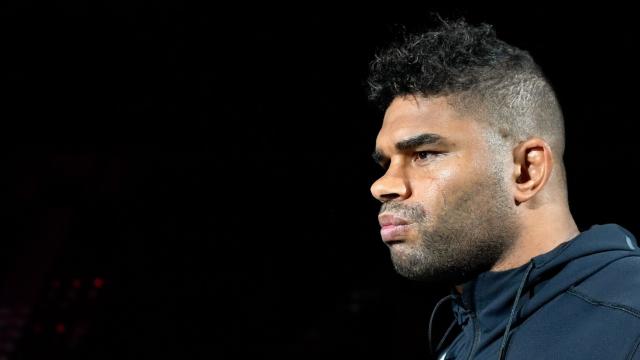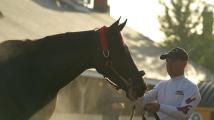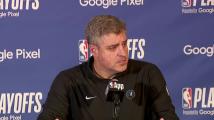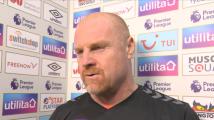Alistair Overeem opens up on his 22-year MMA career and what comes next
MMA veteran Alistair Overeem, who debuted with the UFC in December 2011, speaks to Yahoo Sports' Kevin Iole about his longevity in the sport ahead of his Feb. 6 showdown with Alexander Volkov at UFC Vegas 18.
Video Transcript
KEVIN IOLE: Hey folks. I am Kevin Iole at Yahoo Sports and I guess this is veteran's week this week. We have UFC Vegas 18. Yesterday I had Frankie Edgar, who today is celebrating 14 years in the UFC. And I got a guy that blows Frankie Edgar away.
He started MMA in 1999. Prince was singing about that year back then. My man, Alistair Overeem. How are you, Alistair?
ALISTAR OVEREEM: I'm good. Hanging in there. Still hanging in there after all these years.
KEVIN IOLE: 21 years. There are fighters who were born after you started in MMA. This is crazy. Do you ever think what a wild journey this has been, you're on?
ALISTAR OVEREEM: Yeah, many times. Like on training camp, a lot of time to think, right? A lot of time to reminiscing about the past and it's been one big, gigantic, crazy adventure, which, I don't know, I love, apparently. And I also believe I was born for it.
But, yeah it's been wild. It's been wild. It's took me all over the world, in all sorts of scenarios, situations. I've met so many-- all kinds of people, great people, terrible people. And here we are, 22 years. What is it, 21? '99, right?
Yeah, it was 22 years. Yeah.
KEVIN IOLE: Yeah.
ALISTAR OVEREEM: Yeah, 22 years. Crazy.
KEVIN IOLE: I mean, I guess Chase Hooper was like, you know, I don't think, know if his mom and dad met when you were-- when you started. That is funny. You're fighting Alexander Volkov in the main event on Saturday at APEX in a really important heavyweight fight.
And let's start with the heavyweight division. You know, I kind of said yesterday, I thought the division was a little bit tiered. Where you had Francis and Stipe, right now, they've kind of separated themselves at the top and then you know maybe Curtis Blaydes and then everybody else. You know, do you think will win over a guy like Volkov will vault you up that list and keeps alive the shot-- you know, the shot at maybe one more title run?
ALISTAR OVEREEM: Absolutely. Right? We have another winning streak and if it was not for the Rozenstruik fluke, it would have been a really long winning streak.
KEVIN IOLE: Right.
ALISTAR OVEREEM: But, I don't know. We have to be thankful. We have to be grateful for what we have. The winning streak now is good. It's been coming off of two big wins.
If we can add Volkov to the list, I think, you know, what is it? One loss out of the last six or something? So, I think we're going to be right up there again.
KEVIN IOLE: Do you feel like when you look at where you are, that even though athletically maybe you're not the same as when you were a young guy, that you're better because of your experience? I asked Frank Jeager that question yesterday. To me, I think it's really fascinating to hear you say this, because you've gone over so many body transformations, and weight class changes and everything. You know, to me, it seems like right now, maybe, you're fighting as good as you have since at least when you beat Brock.
ALISTAR OVEREEM: Well, you become more creative and you become a better fighter. I have more tools to the tool set. So, yeah, there's more ways and-- It comes with experience. It comes with what you're training, the way you're training.
You should always become a better fighter than you were yesterday. And I just always kept that, right? So, now, after-- what is it? 22 years, there's like just so many weapons, so many tools, so many strategies, tactics. And MMA is also very-- a sport everything is possible.
So, it's just about how creative you, yourself are. And then you can-- and your creativity bringing that into reality, into the fights, but there is no limit. And that's what I love about the sport.
KEVIN IOLE: You mentioned the loss to Jairzinho Rozenstruik. You lose that fight after one in 24 minutes and 50 seconds of the fight. I mean, you absolutely dominate him, get caught with a massive punch and the fight is stopped in the waning seconds. Now you go into the Walt Harris fight and I want you to take me through when you're on the ground.
Walt Harris, I thought had you finished, right? I mean, you know, not a lot of guys would have gotten out of that situation. Can you take me through what was going through your mind as you're on the ground there? Because you got to be thinking, hey, you know what, this is-- you know, I'm in a really bad spot and I got to do something dramatic here.
ALISTAR OVEREEM: Well, when you're fighting, the better thing to do is to not think. Because when you're thinking, you're already too slow. If you're thinking, hey, [BLEEP], this is not good, you're already going to get punched three times and it's done.
So it's all about reacting, reaction. And for me, it was just like, I'm just going to get out of here. Not good, get up.
KEVIN IOLE: Do you think the 2005 or even the 2015 Alistair Overeem would have been able to get himself out of that situation, given who you had on top you and what he was doing to you?
ALISTAR OVEREEM: The 2005 or 2015?
KEVIN IOLE: Either one. Do you think either version of those-- So, let's go 10 years apart. The 2005 Overeem, if you're in that position, would you have gotten out? And then we'll go, advance 10 more years, the 2015 Overeem where you were in 2015. Would you have broken that position, had you been that fighter in 2020?
ALISTAR OVEREEM: I don't know, to be honest. I don't know. Maybe, maybe not. I don't know. That's a question, what if you got out eight years ago? Maybe I would, maybe I wouldn't. I don't know.
When it was 2005, I was light heavyweight. So, maybe that would have been a little bit difficult, right? But, no, good question, but I don't know.
KEVIN IOLE: Yeah. And I guess I asked that because, you know, I guess the real question I'm asking you there is, did your experience lead you to get-- break that position?
ALISTAR OVEREEM: Well, part experience, but also technique. And in my opinion, I-- OK, it was a direct hit, right? I'm stumbling back.
But I was not out of it. I was still in the fight. I was still very much into it and even the subsequent strikes that landed, because he landed a couple, a couple good ones, I would say. But I was not-- I was not hurt by it.
I was still in the fight. I was still in there. And it showed, right? I got out of a position and was able to reverse the fight.
KEVIN IOLE: So you beat Sakai in September, now here going forward into, I think a fascinating fight with Volkov. A guy, you know, a lot like yourself. You know, kickboxer, a lot of-- you know, I mean, so to me, this should be a really fun, entertaining fight. I mean, where do you see your advantages over Alexander?
ALISTAR OVEREEM: Well, for some certain reason, I just think I'm better everywhere. But, we do need to establish that. We do need to do it, right? We do need to win the fight.
And yeah, Volkov has his attributes, right? He's got to reach advantage. He is a good striker, he's patient, he's clever, he's tough. But I don't know, it's going to be a fight. We're going to bring it to him.
We'll have to, right? Because I'm the shorter man. But I'm excited. I'm excited about the prep, excited about the game plan, excited about everything. Excited about the X factor, even in the fight.
KEVIN IOLE: Exactly. You know, according to the tale of the tape, and I don't know if it's accurate, but they have both you guys with an 80 inch reach, but he's two inches taller than you. Does height make a factor? Like, you know, you don't fight bigger guys too often, right? You know, it's not often you're fighting somebody 6'7". Does that take some adjustment in training?
ALISTAR OVEREEM: Definitely is-- it definitely is different, right? You're going to have to adapt. And it's also how does somebody use that height? When Volkov uses it, he's got his kicks, he's got his long arms.
So, it's all about how does he use it? How will I respond? What am I going to do? What it's my game plan? And yeah, that promises for great fireworks this Saturday.
KEVIN IOLE: Yeah. And do you feel like a win over a Volkov now-- now you're 5-1 in your last six fights. Where does that leave you in the division? I mean, obviously you're right up there.
Once we get down with Stipe and Frances, do you-- do you have to go to Curtis again? I think Curtis feels like he deserves a shot at the title without having to fight again. But, I don't know. How do you see that playing out?
ALISTAR OVEREEM: Well we'll see what happens. But I wouldn't fight Curtis again. That's something that we kind of agreed on. Now we're training together. I think he's a really good guy, a fine sparring partner. I like him a lot.
So, we just have that relationship of supporting each other and helping each other. So, there's not going to be a fight between us possible. And yeah, we'll see what else is going to be available, right? Who else, what else. Obviously, Curtis got his fight coming up. So, we'll see.
KEVIN IOLE: You-- you know, you also said, after you fought Walt Harris, that you know, you would train with him. A, did that happen? And B, is this, you know, is this a new Overeem? Like, has this always been your behavior or is this something new that you're doing as you've matured and kind of learned about the sport?
ALISTAR OVEREEM: Well, some fighters you like, right? I like Walt. He's a cool guy. From the get go, we got along. I saw him at the-- we never really spoke, but then we spoke briefly before our first fight, which fall through, that December.
And he was just always a cool guy. So, yeah, cool people you want to help, right? You want to help them out.
It didn't happen, by the way. I did reach out to him, but for some sort of reason it didn't materialize yet. So, hopefully in the future we can train together and then I can help him.
KEVIN IOLE: Yeah. I just want to ask you a question about him. Obviously, that was a tough time with what happened with his first fight back after his daughter's murder and everything. But, you know, Walt seems like a guy, still a work in progress.
You know, he's in his mid 30s, but like, he seems like a guy that's still you learning how to fight and what he's doing. If he puts it all together, in your opinion, how good can that guy be?
ALISTAR OVEREEM: Well-- I don't know yet, because I never really trained with him. But everybody's got potential, right? It's all about your mindset, becoming better every day. So, we'll see. We'll see what's going to happen with him. I
Don't-- yeah, I don't know him that well, right? I fought him. I beat him, but yeah, I don't know his exact level, to be honest. But I do know that he's on a two fight losing streak, so he does need to change something.
KEVIN IOLE: Right. You are-- you know, obviously, and once you hit 40-years-old, you know, everybody is going to ask you when the end comes and all that. I mean, have you set a time limit on it?
Do you know how much longer you want to do this? And most importantly, because you're such a fascinating guy, what is next? I mean, what do you have in the hopper once you're not doing-- beating people up anymore?
ALISTAR OVEREEM: So, I'm thinking one to two years fighting and then that's done. I'll be 41, 42. And most likely will become a coach. I intend to set up a team in Netherlands and in Thailand. So, I'll be between those spots.
A little bit-- a little bit of USA in there as well. But, yeah, more to the coaching. I love the sport, right? I think with my 28 years of training and 24 years of competing, I have a tremendous wealth of knowledge, experience, information that I can share. And for some sort of reason I like to-- I like to teach.
I like to teach other people. That really is a passion. I would help teammates now, and I like to do that. So, that's going to be awesome to have a goal in my next phase of my life.
Also a big focus will be my family, my kids. Because, obviously, now the focus is on myself and the sport, but that focus will be going also on them. And yeah, I hope to spend-- to fill my days with the new passion in coaching and my family.
KEVIN IOLE: Yeah. I want to ask you, were you mostly focused on coaching MMA or, you know, you were such a great kickboxer and you have so much knowledge in that aspect. Will you work with kickboxers as well?
ALISTAR OVEREEM: Well, kickboxing seems to be a sport that is going down, right? Less interest worldwide it seems. So my focus would definitely be on MMA, MMA striking, but also BJJ. I'll probably get my black belt and I'll probably also do that. I love the sport of BJJ as well.
KEVIN IOLE: Wow, that is amazing. You know, you think of where you were when, you know, now and here you are talking about getting your black belt and everything. I mean, the growth that you've made over the years has been phenomenal.
It's really been amazing. And how many top guys-- like, you know, you go back and I know, one thing I love about MMA is the fact that most of the fighters do have a lot of good names on the resume. But there are not too many that have as many big names as you do.
ALISTAR OVEREEM: Yeah. It's been a long career of everything in it, right? So, we beat on a lot of top guys. We also racked up some losses. We have to be honest about that too.
KEVIN IOLE: Right.
ALISTAR OVEREEM: But overall, I think it's an impressive piece of work.
KEVIN IOLE: When you end it, like, what is going to be the part that you'll miss the most? Is that the actual fights themselves or is it the training camp or the relationships you have with the team? Like, what do you think is going to be the thing that you'll miss the most?
ALISTAR OVEREEM: I don't know, because I have obviously not stopped yet, right? I've been active for a long time and I never really stopped or had a break. So, I don't know what I will miss.
Yeah, I don't know. You know, I intend to and, you know, after I'm done fighting, I still intend to train, and I still intend to diet and I still intend to do all those things. You're talking about the team energy, the team spirit.
Well, when I teach, I intend to create, recreate that, right? But I will have a different role. Maybe you could miss the adrenaline, right? Because with fighting comes very adrenaline. You know, do or die time, that could maybe be missed.
I don't know about that yet, right? So, we'll have to see. We'll have to see. We'll have to see. It's a very big change for me, I realize that, but I don't know yet how that's going to impact me. I am prepared for it though. I've been preparing for it for a long time, right?
By having other goals, important goals, right? The family, and the teaching, and replacing that, what I'm doing now. So, yeah, it's going to be a work in progress. I'm going to have see how it goes. But I--
KEVIN IOLE: Go ahead.
ALISTAR OVEREEM: I kind of see it as a fight, as a new fight, a new prep, and I have all the intention of winning that. I'm a competitor.
KEVIN IOLE: Everything a challenge for Overeem. Well, let's wrap up. I just want-- a couple other things I want to ask you about it. Well, you know, you had mentioned the dieting and everything and I had referenced a little bit earlier, you know, you've gone through these body changes.
And, you know, it seems like you've hit a really good spot in terms of your body and your weight that you're coming in. You're not quite-- you're still a massive guy, right? But you're not that hulking guy that you were at one point. Did you make a conscious effort to say, OK, I need to take a little weight off and kind of get-- find that sweet spot in terms of where you want to find that and what you wanted your body type to be?
ALISTAR OVEREEM: OK. So, I just dieted and just let it be what it was. I was never really fixated on any particular diet or number, or any particular look. I just ate really healthy and it became what it became.
KEVIN IOLE: Hmm, interesting. Yeah, to me the difference in you, you know, when I saw you, you know, as giant as you were compared to now, it's almost like it was intentional. So you just-- it just is what it is. Maybe you're working harder.
ALISTAR OVEREEM: Working more intelligent. Always worked hard. Working more intelligent now, for sure. no, but different times also require different weapons and tools, right?
KEVIN IOLE: Right.
ALISTAR OVEREEM: And for that time, the hulk was good, right? Smashing through those K1 guys. And now, fighting those five rounders every time, it's not good to pack too much weight, too much muscle.
You need to be a little bit more slim, athletic, a little bit more slick and tricky. And strategy comes into play, right? And that doesn't work out when you're tired, when you get tired. And when you're to 260, 265, I don't think that's good for five rounds.
KEVIN IOLE: There you go. Well, Alistair always fun to talk to you, always fun to watch you fight. Even more fun to watch your fight than it is to talk to and always fun to talk. My man, I wish you the best of luck against Volkov on Saturday and we will see you there. All the best to you.
ALISTAR OVEREEM: Yeah. Good to talk to you, man.








